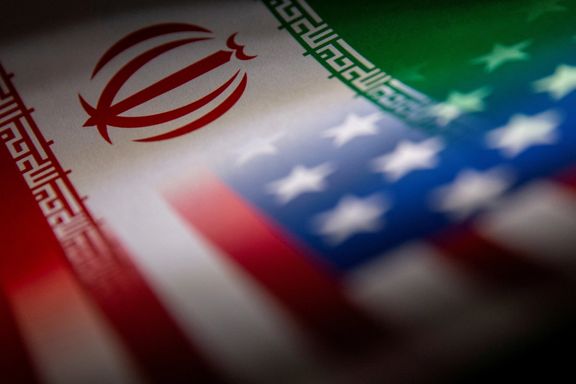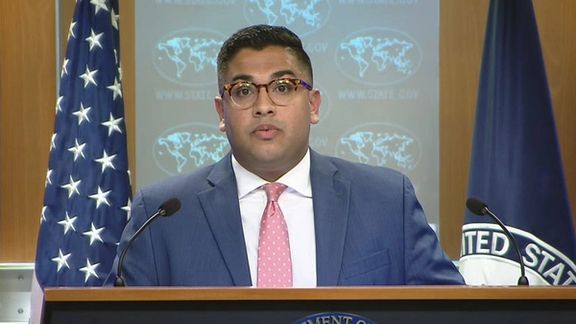US Continues To Evade Details Of Iran Deal

US officials remain tight-lipped on the release of $6bn of frozen funds from South Korea to Iran as questions on its use remain unclear.

US officials remain tight-lipped on the release of $6bn of frozen funds from South Korea to Iran as questions on its use remain unclear.
In the latest US State Department press briefing, Vedant Patel continued to push the line that the funds would primarily be used for “humanitarian” purposes, in line with the rules surrounding sanctions.
During a barrage of questions from the world’s media, he said: “It’s Iran’s money and allowing Iran to use such funds for humanitarian purposes is consistent with longstanding US policy to ensure that our sanctions do not prevent humanitarian goods and services from flowing to ordinary people no matter how objectionable or problematic their government is.”
However, the big question is, will the “ordinary people” see any benefit of the released funds, or will it simply get channeled into the regime’s military machine. Iranian officials have said that the funds will be transferred into euros once sent to Qatar, which will mean the US will not have a direct way to track wire transfers from accounts in Qatar that hold the money.
Meanwhile, as Iran International reported this week, additional media reports suggest not only a $6 billion release from South Korean banks, but also the unlocking of frozen funds in Iraq (estimated between $11-12 billion) and over $3 billion from Japan. These funds will be held in Qatar and Oman, designated for Iran's purchases of essential goods such as food, medicine, and other humanitarian items.

In a bid to calm the storm, Patel said “any kinds of funds that move will be subject to the same rigorous restrictions once it moves out of South Korea”.
Attempting to explain the situation, his attempts were not well received. He added: “The reason these funds are in South Korea in the first place is because the previous administration allowed several countries to continue purchasing oil from Iran and to place those funds in special accounts. These funds have been available to Iran to use for humanitarian transactions, like food and medicine, since the previous administration.”
While Patel acknowledged the very real threat which remains of the regime’s destabilizing actions across the Middle East and beyond, including its provision of drones for Russia’s war on Ukraine and the suppression of human rights in Iran, he offered no answers as to how he could guarantee the funds would not somehow be funnelled into Iran’s terror campaign.
Focusing on the recent release to home arrest of five American citizens, Patel attempted to divert attention to the seeming success of the talks, though he refused to share further information about the length of house arrest and next steps to bring the hostages home.
“What this is about is bringing American citizens home and we hope that a process has started last week, and we hope that at the end of this process, these five American citizens will be able to come back to the United States, and that’s what we’re going to continue to work for,” he said.
When quizzed on the status of Shahab Dalili, who is still in prison in Iran and who has, along with his son outside the White House, just begun hunger strikes, Patel questioned his being wrongfully imprisoned. Dalili, 60, was a shipping captain who had emigrated to the United States after retiring, and was detained in Tehran in April 2016 during a visit for his father's funeral.
“In the case of Mr. Dalili, it has not yet been determined if he is being wrongfully detained,” he said, claiming that stand-in envoy Abram Paley has spoken to the family while details are hammered out. He was charged with aiding and abetting a foreign country and was handed a 10-year prison sentence that he is serving in Iran's Evin prison which holds many political prisoners. The father-son hunger strike is a desperate cry for help for the ageing American excluded from the latest round of releases.
The situation of dismissed envoy Robert Malley, on charges of leaking confidential information, was also a point of contention. While the US Envoy to Iran’s Twitter picture has been changed, amidst a complex investigation, including by the Federal Bureau of Investigation, Patel only said he had no further details other than that “Rob Malley is on leave; Abram Paley is leading the department’s work in this area, and I will leave it at that”.
While many questions remain, Patel claimed the US has “not changed any aspect of our overall approach to Iran”, whether that relates to the nuclear program, the regime’s malign activities in the region or human rights crackdowns. But as most companies are either tied to the IRGC or the regime, it seems hard to believe that this new influx of funding would be used for anything more than bolstering Iran’s defenses either at home or abroad.
As worries continue, Iran’s foreign ministry has denied the weight of US controls, claiming “the Islamic Republic will decide how to use the released funds, and these funds will be appropriated for the various needs of the country by the appropriate authorities”. The truth of this, is yet to be seen.